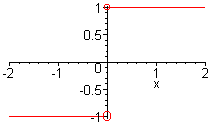Limits
Example
Consider the function
x2 - 1
f(x) =
x2 +2x - 3
If we plug in 1 we arrive at 0/0 which is undefined. What does this function look like near x = 1?
We can construct the following table:
| x | .9 | .99 | 1.1 | 1.01 | 1.001 |
| f(x) | .487 | .499 | .512 | .501 | .5001 |
We can see that this function approaches .5 as x approaches 1. Below is the graph of this functions.

This example leads us to the following definition
Definition of the Limit If f(x) becomes arbitrarily close to a single number L as x approaches c form either side then
|
We can think of the definition of a limit as x -> c as two hikers, one traveling from the right and the other traveling from the left. If they will hike towards the same place, then that place is called the limit.
Properties of Limits
suppose that
![]()
and that a is a constant. then
A)
![]()
B)
![]()
C)

D)
![]()
E)
![]()
Example
Suppose that
![]()
then
![]()
Algebra and Limits
When finding a limit, always plug in the number first. If you get a defined value, then that is the answer. Otherwise you may have to do algebra to find the limit.
Example:
lim as x -> 1 (x2 - 1)/(x2 +2x - 3)
= lim as x -> 1 (x - 1)(x + 1)/(x + 3)(x - 1)
= lim as x -> 1 (x + 1)/(x + 3) = 2/4 = .5
Find the limit

Solution
Notice first, if we plug in 1 for x, we get 0/0. The algebra that will work is factoring.

Now plug in 1 to get
2/4 = 1/2
Example
Find the limit

Solution
Again, if we plug in, we get 0/0. What kind of algebra will work for this problem? Recall from basic algebra how to rationalize the denominator. Our strategy, will be to rationalize the numerator. We multiply the numerator and the denominator by the conjugate root.

Now we can plug in 9 for x to get
1
1
=
4 +
4 8
One Sided Limits
We define the left limit
![]()
as the y coordinate of the curve as the point moves from the left.
Similarly, we define the right limit
![]()
as the y coordinate of the curve as the point moves from the left.
Example
Find

Solution
The graph of the function is pictured below.

Taking a stroll from the left hand side, the y value approaches -1. Hence the limit is -1. Notice that without the "-" sign, the limit would not exist.
We say that the limit exists if the left and the right limits are equal.
Unbounded limits
Example
Find

Solution
Plugging in 2 we get 6/0 which is undefined. If we plug in a number to the left of 2, such as 1.99999, we get a very large negative number. We say that the limit is negative infinity.
Back to the calculus home page
Back to the math department home page
e-mail Questions and Suggestions